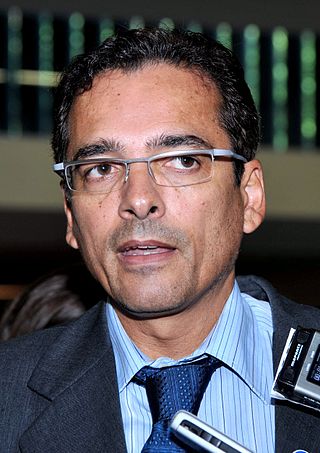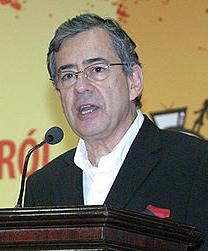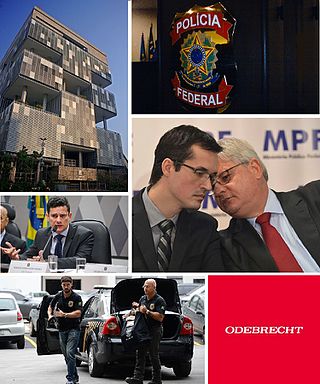
Gilmar Ferreira Mendes is a Brazilian Justice of the Supremo Tribunal Federal, appointed by then President Fernando Henrique Cardoso in 2002. Mendes was the Chief Justice of the Court for the 2008–2010 term. Earlier, he had been the Attorney General from 2000 to 2002.

Protógenes Pinheiro Queiroz is a Brazilian former Federal Police officer, who has led investigations in some of the country's most high-profile corruption cases. Queiroz was responsible for investigations leading to imprisonment of the former mayor of São Paulo, Paulo Maluf. He was a key figure in two investigations, in 2005 and 2007, into corruption scandals in Brazilian football, the latter against Boris Berezovsky's MSI group for money laundering in Corinthians. From 2004 to July 2008 Quieroz led Operation Satiagraha, a major operation into misuse of public funds, money laundering and corruption, leading to the arrest of the banker Daniel Dantas and several other prominent figures, including Celso Pitta, another former mayor of São Paulo.

Paulo Henrique dos Santos Amorim was a Brazilian blogger and journalist.

Paulo Bernardo Silva is a Brazilian politician, member of the Workers' Party (PT). He was Minister of Communications during the government of Dilma Rousseff and Minister of Planning during the government of Luiz Inácio Lula da Silva.

Corruption in Brazil exists on all levels of society from the top echelons of political power to the smallest municipalities. Operation Car Wash showed central government members using the prerogatives of their public office for rent-seeking activities, ranging from political support to siphoning funds from state-owned corporation for personal gain. The Mensalão scandal for example used taxpayer funds to pay monthly allowances to members of congress from other political parties in return for their support and votes in congress. Politicians also used the state-owned and state-run oil company Petrobras to raise hundreds of millions of reais for political campaigns and personal enrichment.

Operation Car Wash was a landmark anti-corruption probe in Brazil. Beginning in March 2014 as the investigation of a small car wash in Brasília over money laundering, the proceedings uncovered a massive corruption scheme in the Brazilian federal government, particularly in state-owned enterprises. The probe was conducted through a joint task force of agents in the federal police, revenue collection agency, internal audit office and antitrust regulator. Evidence was collected and presented to the court system by a team of federal prosecutors led by Deltan Dallagnol, while the judge in charge of the operation was Sergio Moro. Eventually, other federal prosecutors and judges would go on to oversee related cases under their jurisdictions in various Brazilian states. The operation implicated leading businessmen, federal congressmen, senators, state governors, federal government ministers, and former presidents Collor, Temer and Lula. Companies and individuals accused of involvement have agreed to pay 25 billion reais in fines and restitution of embezzled public funds.

Sergio Fernando Moro is a Brazilian jurist, former federal judge, college professor, and politician. He was elected as a member of the Federal Senate for Paraná in October 2022. In 2015, he gained national attention as one of the lead judges in Operation Car Wash, a criminal investigation into a high-profile corruption and bribery scandal involving government officials and business executives. Moro was also Minister of Justice and Public Security under the presidency of Jair Bolsonaro from 2019 to 2020.

Alexandre de Moraes is a Brazilian jurist, former politician, former president of the Superior Electoral Court and currently justice of the Supreme Federal Court. Moraes was appointed to the Supreme Court by President Michel Temer in 2017 when serving as Minister of Justice and Public Security. Previously, Moraes had acted as Secretary for Public Security in the State of São Paulo and had been a member of the Brazilian Public Prosecutor's Office.
Érika Mialik Marena is a chief of the Federal Police of Brazil, she is known for her role in Operation Car Wash.

A long series of criminal investigations have occurred in Brazil associated with Operation Car Wash, since the first one began in March 2014. These investigations are considered offshoots of the original phased investigations.

A long series of criminal investigations have occurred in Brazil associated with Operation Car Wash. The first investigation was launched in March 2014, and is now known as phase 1 of the investigation, with subsequent inquiries numbered sequentially and having code names such as phase 2, phase 3, and so on. By February 2021, there were 80 announced phases of Operation Car Wash.

The Odebrecht–Car Wash leniency agreement, also known in Brazil as the "end of the world plea deal", was the leniency agreement signed between Odebrecht S.A. and the Public Prosecutor's Office (PGR) in December 2016, as part of Operation Car Wash. The agreement provided for the deposition of 78 of the contractor's executives, including the former president Marcelo Odebrecht, and his father, Emílio Odebrecht, which generated 83 investigations at the Supreme Federal Court (STF).
This glossary contains Brazilian terms related to criminal or corruption investigations, and supporting concepts from politics, the law, government, criminology, and law enforcement.

Moro x Bolsonaro Case, also known as Moro Case or Inquiry (INQ) 4831, refers to a police investigation in which statements made by former minister Sergio Moro about President Jair Bolsonaro's alleged attempt to interfere politically in Federal Police of Brazil and in investigations related to his family members.

Events in the year 2022 in Brazil.

The Vila Cruzeiro shootout took place on 24 May 2022 in the favela of the same name in Rio de Janeiro, during a joint operation by the Special Police Operations Battalion (BOPE), the Federal Police and the Federal Highway Police that resulted in at least 26 people killed by gunshots or cutting objects. It was the second most lethal police operation in the city of Rio de Janeiro, second only to the Chacina do Jacarezinho, which occurred a year earlier.

Police operations in the 2022 Brazilian general election were coordinated actions carried out by the Federal Police of Brazil and the Federal Highway Police, mainly during the second round of the 2022 Brazilian presidential election. They targeted public transportation vehicles, mainly in the Northeast Region, Brazil, allegedly with the aim of ensuring transportation safety according to their supporters, or delaying the arrival of these vehicles at polling places according to critics.
Operation Lesa Pátria is a set of ongoing investigations led by the Federal Police of Brazil investigating financiers, participants, and organizers of coup d'état attempts in Brazil, particularly related to the attacks on the headquarters of the Three Powers on 8 January 2023, in Brasilia. The task force is considered permanent by the Federal Police, with "periodic updates on the number of warrants issued, people captured and fugitives". Operation Lesa Pátria is the largest police operation launched in Brazil since Operation Lava Jato (2014-2021).

The JBS Testimonies in Operation Car Wash refer to the leniency agreement signed between the company JBS and the Office of the Attorney General of Brazil (PGR) in April 2017, within the scope of Operation Car Wash. The Brazilian Supreme Federal Court (STF) approved the agreement on May 18, 2017, based on the plea bargain of the owners Joesley and Wesley Batista and executives of the company. On September 14, 2017, former Attorney General Rodrigo Janot rescinded the agreement with Joesley and Ricardo Saud due to suspicions of obstruction of investigation by the collaborators. The following year, Attorney General Raquel Dodge rescinded the agreement with Wesley Batista and Francisco de Assis e Silva due to their omission of criminal facts of which they were aware.
Port Investigation refers to a police inquiry under the responsibility of the Federal Police of Brazil that investigates the alleged favoritism of companies connected to the port sector by a decree signed by President Michel Temer, which extended concession contracts at the Port of Santos. The company Rodrimar was said to be the main beneficiary of the decree issued by Temer, which, according to investigators, was edited in exchange for bribes to the president and his main allies. For the first time in the country's history, a sitting president has had their bank records broken as a result of an investigation. In addition, the investigation led to Operation Skala, which temporarily arrested allies and friends of the president, as well as businessmen from the port sector. The case is being handled by Luís Roberto Barroso, a justice of the Supreme Federal Court. The inquiry was concluded on October 16, 2018, resulting in the indictment of eleven individuals, including Michel Temer and his daughter Maristela, with requests for the seizure and blocking of assets of all the accused and requests for the preventive imprisonment of four of them. The rapporteur forwarded the inquiry to the Attorney General's Office for a response within 15 days.












